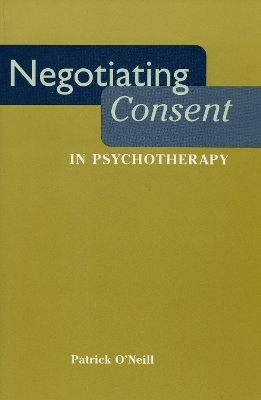
Negotiating Consent in Psychotherapy
Seiten
1998
New York University Press (Verlag)
978-0-8147-6195-3 (ISBN)
New York University Press (Verlag)
978-0-8147-6195-3 (ISBN)
There is an ethical requirement that psychotherapists inform clients about their treatment methods, alternative-treatment options, and alternative conceptions of the clients' problems. This is a detailed study of ways in which therapists and clients negotiate consent.
Psychotherapists have an ethical requirement to inform clients about their treatment methods, alternative treatment options, and alternative conceptions of their problem. While accepting the basis for this "informed consent" requirement, therapists have traditionally resisted giving too much information, arguing that exposure to alternative therapies could cause confusion and distress. The raging debates over false/recovered memory syndrome and the larger move towards medical disclosure have pushed the question to the fore: how much information therapists should provide to their clients?
In Negotiating Consent in Psychotherapy, Patrick O'Neill provides an in-depth study of the ways in which therapists and clients negotiate consent. Based on interviews with 100 therapists and clients in the areas of eating disorders and sexual abuse, the book explores the tangle of issues that make informed consent so difficult for therapists, including what therapists believe should be part of consent and why; how they decide when consent should be renegotiated; and how clients experience this process of negotiation and renegotiation.
Psychotherapists have an ethical requirement to inform clients about their treatment methods, alternative treatment options, and alternative conceptions of their problem. While accepting the basis for this "informed consent" requirement, therapists have traditionally resisted giving too much information, arguing that exposure to alternative therapies could cause confusion and distress. The raging debates over false/recovered memory syndrome and the larger move towards medical disclosure have pushed the question to the fore: how much information therapists should provide to their clients?
In Negotiating Consent in Psychotherapy, Patrick O'Neill provides an in-depth study of the ways in which therapists and clients negotiate consent. Based on interviews with 100 therapists and clients in the areas of eating disorders and sexual abuse, the book explores the tangle of issues that make informed consent so difficult for therapists, including what therapists believe should be part of consent and why; how they decide when consent should be renegotiated; and how clients experience this process of negotiation and renegotiation.
Patrick O'Neill is Professor of Psychology at Acadia University in Nova Scotia. He is also a coauthor of Community Consultation.
| Erscheint lt. Verlag | 1.11.1998 |
|---|---|
| Reihe/Serie | Qualitative Studies in Psychology |
| Verlagsort | New York |
| Sprache | englisch |
| Maße | 152 x 229 mm |
| Gewicht | 286 g |
| Themenwelt | Medizin / Pharmazie ► Medizinische Fachgebiete ► Medizinethik |
| Medizin / Pharmazie ► Medizinische Fachgebiete ► Psychiatrie / Psychotherapie | |
| Studium ► Querschnittsbereiche ► Geschichte / Ethik der Medizin | |
| ISBN-10 | 0-8147-6195-X / 081476195X |
| ISBN-13 | 978-0-8147-6195-3 / 9780814761953 |
| Zustand | Neuware |
| Haben Sie eine Frage zum Produkt? |
Mehr entdecken
aus dem Bereich
aus dem Bereich
Die Geschichte eines Weltzentrums der Medizin von 1710 bis zur …
Buch | Softcover (2021)
Lehmanns Media (Verlag)
CHF 27,90
von der Antike bis zur Gegenwart
Buch | Softcover (2024)
C.H.Beck (Verlag)
CHF 16,80
Krankheitslehren, Irrwege, Behandlungsformen
Buch | Softcover (2024)
C.H.Beck (Verlag)
CHF 55,90


